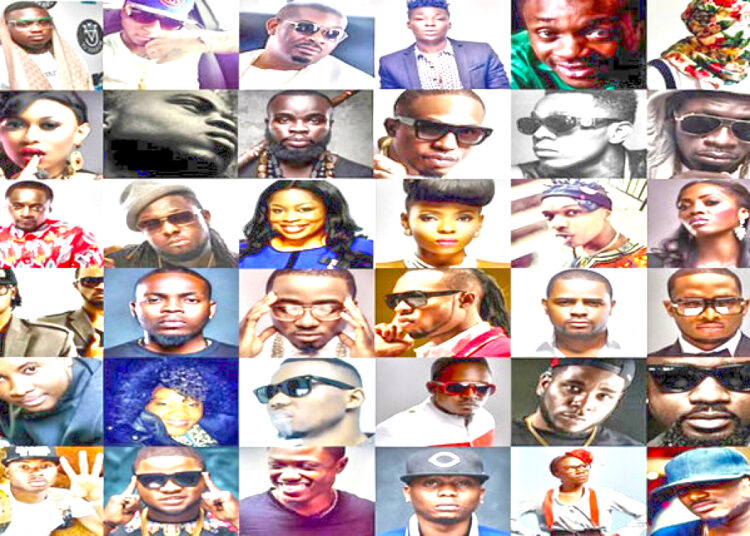In a population that has more than half of its people, Nigeria is said to possess a young populace of Under 18(years}. This demography is faced with a lot of challenges amidst a great potential and human capacity in need of development.
It can be said that a good number of this set of Gen Zs now aspire to become creatives, one of which is a musician or music producer.
In times past Nigerian music artistes have waltzed and excelled valiantly owing to the rich deposit of artistic and cultural talent imbued in every Nigerian child and passed from one generation to another. But fate has not done today’s musician well as the structure to hone a talent organically is not in place as it has been for decades.
According to a musicologist and live performing artiste, Abbey Afowoslide, only two out of every ten young artistes in Nigeria realise his or her potential and attain the peak of career fulfillment. This is because of the impediments that clog the wheels of progress of an average musician that leave many to quit the stage of music artistry because the system to hone a talent is not really there in terms of support systems, lack of sufficient and standard music label, limited recording studios and deficient artistes managers and other crews that make for a music star organically.
“Nigerian music artistes have done well for themselves with the afrobeats genre showcasing today’s artiste on the global scale. But let us introspect this- the artistes- be it actors, stahe play theatre artistes or musicians were seen as never do wells in the 80s and even 90s. The toga and wrong perception still rear its ugly head today and accounts for the standard of remuneration accorded these creative. For every Wizkid, Tu Face Idibia, Tiwa Savage, Burna Boy, Davido and Yemi Alade that made the spotlight globally, there are several of these intrinsically talents who had no support system or chickened out when huge fees to pay to the studio producer, radio djs as a budding singer smack them in the face. I have faced all this and it starts with one’s parent showing reticence or blatant no-approval in supporting one’s music career to the young artistes slugging it out in the studio and having to do menial jobs to raise funds for his music trainings or to produce his or her songs,” says Abiodun Folaranmi popularly known as Abbey trombone.
Dilemma of A Music Artiste Without A Music Label
With the advent of social media, YouTube and technology, todays musicians can navigate the process of getting his or her music out there to listeners but the work is half done, says, a musician cum music producer, Shigo Bass. “A musician who has no music label or working contract with a music or recording label will suffer the path of getting his music out. Such artistes in the western world are referred to as Inde (independent artiste) artistes and that en d up forming their own music label which revolves around them more often than not.
Popular musician and Afrobeat veteran, Duro Ikujenyo stated that the paradigm may have changed for today’s musician as technology is seen as a game changer but to which extent.
“Before now, and I am saying in the 60s, 70s and 80s, we had foreign music labels who cater for the artistes of yore. We had EMI, Sony Music label before the likes of home grown record label like Ogo Oluwa Kitan Records, Tabansi records and Ivory music came on board. At the advent of the Nigerian brand of Hip-hop era of the mid 90s and 2000s, we had the likes of Storm Records, Trybe Records, Mo’ Hits record, Kennis Music and others.
According to a writer, Dami Ajayi, ‘the 80 and 90s saw the rise of digital music, the proliferation of reggae music, as well as the birth of Nigerian hip-hop music. This era brought a bevy of stars like Dizzy K, Junior and Pretty, Ras Kimono, Christy Essien-Igbokwe, Charlie Boy, Daniel Wilson, Zubby Enebeli, Alex Zito, Blackky, and Evi Edna-Ogholi. But none of these musicians was as successful as the reggae super-star, Majek Fashek, who later migrated to America in the ‘90s and consolidated his phenomenal success in the Diaspora’. All these artistes during the golden era of Nigerian music had record labels that supported them. Today, there are only a handful of record labels – Chocolate City, Marvin, DMW, Star Boy, YBNL, 5 Star and a few others seen as the biggest labels on offer in Nigeria.
How Today’s Inde Artistes Navigate The Waters
According to Fela’s song, ‘Sorrow, Blood and Tears’, which can apply to the sacrifice and pain endured by young artistes who have no record labels to lean on. Hundreds of contemporary artistes do not realise their potentials because of these bottle necks outlined earlier. A young music artiste pays between N7,000 and N11,000 per session at the studio and if he is to release a single, the artiste who has a good and considerate producer would have owed sums of money to the beat maker or would have coughed out nothing less than N70,000 to record a song depending on his proficiency. With the increase in fuel price which is used to power generators at the studio the price is more. But it is not all gloom as most big artiste of today have experienced this until a record label comes calling. The passion and indeed the dream outweigh the pains.











